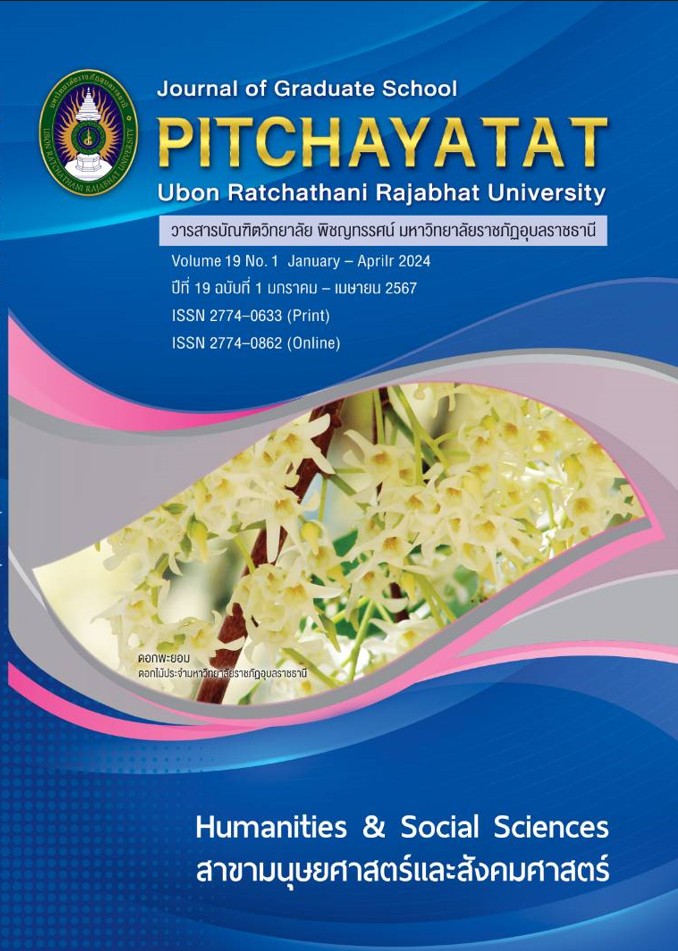การพัฒนารูปแบบการบริหารงานเพื่อเสริมสร้างคุณธรรมจริยธรรมของนักเรียนโดยบูรณาการหลักปรัชญาของเศรษฐกิจพอเพียง โรงเรียนนาทรายวิทยา องค์การบริหาร ส่วนจังหวัดอุดรธานี 2 อำเภอพิบูลย์รักษ์ จังหวัดอุดรธานี
คำสำคัญ:
รูปแบบการบริหาร, คุณธรรมจริยธรรม, บูรณาการหลักปรัชญาของเศรษฐกิจพอเพียงบทคัดย่อ
การวิจัยนี้มีวัตถุประสงค์เพื่อ 1) ศึกษาข้อมูลพื้นฐาน ทฤษฎีที่เกี่ยวข้องและความคิดเห็นต่อสภาพ การพัฒนารูปแบบการบริหารงานเพื่อเสริมสร้างคุณธรรมจริยธรรมของนักเรียนโดยบูรณาการหลักปรัชญา ของเศรษฐกิจพอเพียง โรงเรียนนาทรายวิทยา องค์การบริหารส่วนจังหวัดอุดรธานี 2 อำเภอพิบูลย์รักษ์ จังหวัดอุดรธานี 2) พัฒนารูปแบบการบริหารงานเพื่อเสริมสร้างคุณธรรมจริยธรรมของนักเรียนโดยบูรณาการหลักปรัชญาของเศรษฐกิจพอเพียง 3) ทดลองใช้รูปแบบการบริหารงานเพื่อเสริมสร้างคุณธรรมจริยธรรมของนักเรียนโดยบูรณาการหลักปรัชญาของเศรษฐกิจพอเพียง และ 4) ประเมินรูปแบบการบริหารงานเพื่อเสริมสร้างคุณธรรมจริยธรรมของนักเรียนโดยบูรณาการหลักปรัชญาของเศรษฐกิจพอเพียง ประชากรที่ใช้ในการวิจัย ประกอบด้วย ผู้บริหารสถานศึกษา จำนวน 1 คน ครูผู้สอน จำนวน 27 คน และนักเรียน จำนวน 207 คน เครื่องมือที่ใช้ ได้แก่ คู่มือการดำเนินกิจกรรม แบบสอบถาม แบบสัมภาษณ์ แบบประเมินคุณธรรมจริยธรรมพื้นฐาน 8 ประการ แบบประเมินความพึงพอใจ และแบบประเมินรูปแบบ สถิติที่ใช้ ได้แก่ ร้อยละ ค่าเฉลี่ย ส่วนเบี่ยงเบนมาตรฐาน และวิเคราะห์เนื้อหา
ผลการวิจัยพบว่า
- ผลการประเมินความคิดเห็นต่อสภาพการพัฒนารูปแบบการบริหารงานเพื่อเสริมสร้างคุณธรรมจริยธรรมของนักเรียน โดยบูรณาการหลักปรัชญาของเศรษฐกิจพอเพียง มีความคิดเห็นอยู่ในระดับมาก (
= 4.44,
= 0.19) และข้อเสนอแนะว่าควรเป็นรูปแบบที่ใช้ใช้กระบวนการหลักปรัชญาเศรษฐกิจพอเพียง ไปสู่การปฏิบัติก่อเกิดความพอประมาณ ความมีเหตุผลและการสร้างภูมิคุ้มกันที่ดี มีเงื่อนไขความรู้และคุณธรรม ควบคู่กับวงจรการทำงานที่มีคุณภาพ ขับเคลื่อนคุณธรรมจริยธรรมพื้นฐาน 8 ประการ คือ ขยัน ประหยัด ซื่อสัตย์ มีวินัย สุภาพ สะอาด สามัคคีและมีน้ำใจ
- รูปแบบการบริหารงานเพื่อเสริมสร้างคุณธรรมจริยธรรมของนักเรียนโดยบูรณาการหลักปรัชญาของเศรษฐกิจพอเพียง อยู่ในระดับความเหมาะสมมาก (
= 4.47,
= 0.14)
- ผลการใช้รูปแบบการบริหารงานเพื่อเสริมสร้างคุณธรรมจริยธรรมของนักเรียนโดยบูรณาการหลักปรัชญาของเศรษฐกิจพอเพียง
3.1. ผลการประเมินคุณธรรมจริยธรรมพื้นฐาน 8 ประการของนักเรียนหลังการจัดกิจกรรมโดยใช้รูปแบบการบริหาร งานเพื่อเสริมสร้างคุณธรรมจริยธรรมของนักเรียนโดยบูรณาการหลักปรัชญาของเศรษฐกิจพอเพียง อยู่ในระดับดี (= 2.57 คิดเป็นร้อยละ 85.67)
3.2 นักเรียนมีความพึงพอใจต่อรูปแบบการบริหารงานเพื่อเสริมสร้างคุณธรรมจริยธรรมของนักเรียน โดยบูรณาการหลักปรัชญาของเศรษฐกิจพอเพียง อยู่ในระดับมาก (= 4.31,
= 0.24)
4. ผลการประเมินรูปแบบการบริหารงานเพื่อเสริมสร้างคุณธรรมจริยธรรมของนักเรียน โดยบูรณาการหลักปรัชญาของเศรษฐกิจพอเพียง อยู่ในระดับมาก (= 4.40,
= 0.11)
เอกสารอ้างอิง
จิระวัฒน์ โรจนศิลป์. “การบูรณาการเพื่อพัฒนานักเรียนให้มีคุณลักษณะอันพึงประสงค์อยู่อย่างพอเพียงอย่างยั่งยืน สำนักงานเขตพื้นที่การศึกษามัธยมศึกษากำแพงเพชร,” วารสารวิจัยวิชาการ. 5, 4 (กรกฎาคม-สิงหาคม 2565): 309-324.
ชาญชิต ทัพหมี. รูปแบบการพัฒนาการบริหารโรงเรียนคุณธรรม สังกัดสำนักงานเขตพื้นที่การศึกษาประถมศึกษาในเขตภาคเหนือ. วิทยานิพนธ์หลักสูตรการศึกษาดุษฎีบัณฑิต มหาวิทยาลัยนเรศวร, 2564.
ทิศนา แขมมณี. ถอดรหัสปรัชญาเศรษฐกิจพอเพียงสู่การสอนกระบวนการคิด. พิมพ์ครั้งที่ 3. กรุงเทพฯ: โรงพิมพ์แห่งจุฬาลงกรณ์มหาวิทยาลัย. 2559.
ทิศนา แขมมณี. ถอดรหัสปรัชญาเศรษฐกิจพอเพียงสู่การสอนกระบวนการคิด. พิมพ์ครั้งที่ 4. กรุงเทพฯ: โรงพิมพ์แห่งจุฬาลงกรณ์มหาวิทยาลัย, 2566.
พระเกรียงไกร รัตนสีหา. “การส่งเสริมคุณธรรมตามหลักปรัชญาของเศรษฐกิจพอเพียงสำหรับนักเรียนโรงเรียนพระปริยัติธรรมวัดผ่องพลอยวิริยาราม สังกัดสำนักงานพระพุทธศาสนาแห่งชาติ,” วารสารรัฐประศาสนศาสตร์ มหาวิทยาลัยราชภัฏสวนสุนันทา. 1, 1 (มกราคม-เมษายน 2561); 32-44.
พระมหาชานนท์ ชัยมงคล. การศึกษาการพัฒนาคุณธรรมจริยธรรมของนักเรียนโรงเรียนอนุบาลวัดปรินายกสังกัดสำนักงานเขตพื้นที่การศึกษาประถมศึกษากรุงเทพมหานคร. การศึกษาค้นคว้าอิสระศึกษาศาสตรมหาบัณฑิต มหาวิทยาลัยเกริก, 2561.
พระมหารถศรี อินธิสิทธิ์ (ติกฺขปญฺโญ). การบริหารโครงการโรงเรียนคุณธรรม สพฐ.ต้นแบบ : กรณีศึกษาโรงเรียนในจังหวัดสกลนคร. วิทยานิพนธ์ครุศาสตรมหาบัณฑิต มหาวิทยาลัยราชภัฏสกลนคร, 2563.
พินิจ เครือเหลา. การบริหารสถานศึกษาตามหลักปรัชญาของเศรษฐกิจพอเพียงโรงเรียนพิทยาลงกรณ์พิทยาคม. การค้นคว้าอิสระศึกษาศาสตรมหาบัณฑิต มหาวิทยาลัยศิลปากร, 2561.
โรงเรียนนาทรายวิทยา องค์การบริหารส่วนจังหวัดอุดรธานี 2. รายงานการประกันคุณภาพภายในสถานศึกษาปีการศึกษา 2565. อุดรธานี: กลุ่มงานบริหารวิชาการ โรงเรียนนาทรายวิทยา องค์การบริหารส่วนจังหวัดอุดรธานี 2 สังกัดองค์การบริหารส่วนจังหวัดอุดรธานี, 2566.
เลขาธิการสภาการศึกษา, สำนักงาน. ข้อเสนอการปฏิรูปการศึกษาในทศวรรษที่สอง (พ.ศ. 2552-2561). กรุงเทพฯ: พริกหวานกราฟฟิค, 2553.
เลขาธิการสภาการศึกษา, สำนักงาน. แผนการศึกษาแห่งชาติ พ.ศ.2560-2579. กรุงเทพฯ: พริกหวานกราฟฟิค, 2560.
วัฒนธรรม, กระทรวง. แผนแม่บทส่งเสริมคุณธรรมแห่งชาติ ฉบับที่ 1 (พ.ศ. 2559-2564) ตามมติคณะรัฐมนตรี เมื่อวันที่ 12 กรกฎาคม 2559. กรุงเทพฯ: กรมศาสนา, 2559.
ศิรินทร์ทิพย์ ศิริภักดิ์. กระบวนการดำเนินงานตามโครงการพัฒนาคุณธรรมจริยธรรมของนักเรียนโรงเรียนบ้านแวงประชารัฐบำรุง. มหาสารคาม: มหาวิทยาลัยราชภัฏมหาสารคาม, 2561.
ศึกษาธิการ, กระทรวง. แนวทางการดำเนินโครงการการขับเคลื่อนสถานศึกษาเศรษฐกิจพอเพียง. กรุงเทพฯ: สำนักส่งเสริมกิจการศึกษา, 2560.
ศึกษาธิการ, กระทรวง. แนวทางการดำเนินงานโครงการสถานศึกษาน้อมนำศาสตร์พระราชา สู่การพัฒนาอย่างยั่งยืน กระทรวงศึกษาธิการ. กรุงเทพฯ: สำนักส่งเสริมกิจการศึกษา, 2560.
สุจิตตรา บัวขันธ์. การศึกษารูปแบบคุณลักษณะอันพึงประสงค์ของนักเรียนมัธยมศึกษาตอนต้นโรงเรียนเอกชน. อุดรธานี: สำนักงานเขตพื้นที่การศึกษาประถมศึกษาอุดรธานีเขต 1, 2558.
สุระ อ่อนแพง. รูปแบบการบริหารเพื่อพัฒนาคุณธรรมจริยธรรมนักเรียนระดับประถมศึกษา ในสถานศึกษาสังกัดสำนักงานเขตพื้นที่การศึกษาประถมศึกษา. วิทยานิพนธ์การศึกษามหาบัณฑิต มหาวิทยาลัยนเรศวร, 2556.
Bonawiz, Mary Feency. “Analysis and comparison of the Moral Development Required to Graduate with an Ethics Course,” Dissertration Abstracts International. 63, 04 (2002): 1433- A; OCTOBER, 2002.
ดาวน์โหลด
เผยแพร่แล้ว
รูปแบบการอ้างอิง
ฉบับ
ประเภทบทความ
สัญญาอนุญาต
ลิขสิทธิ์ (c) 2024 วารสารบัณฑิตวิทยาลัย พิชญทรรศน์ มหาวิทยาลัยราชภัฏอุบลราชธานี

อนุญาตภายใต้เงื่อนไข Creative Commons Attribution-NonCommercial-NoDerivatives 4.0 International License.
บทความทุกเรื่องได้รับการตรวจความถูกต้องทางวิชาการโดยผู้ทรงคุณวุฒิภายนอกอย่างน้อย 3 คน ความคิดเห็นในวารสารพิชญทรรศน์เป็นความคิดเห็นของผู้นิพนธ์มิใช่ความคิดเห็นของผู้จัดทำ จึงมิใช่ความรับผิดชอบของวารสารพิชญทรรศน์ และบทความในวารสารพิชญทรรศน์สงวนสิทธิ์ตามกฎหมายไทย การจะนำไปเผยแพร่ต้องได้รับอนุญาตเป็นลายลักษณ์อักษรจากกองบรรณาธิการ





